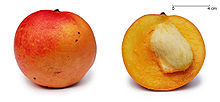
Recalcitrant seeds are seeds that do not survive drying and freezing during ex situ conservation.[1] By and large, these seeds cannot resist the effects of drying or temperatures less than 10 °C (50 °F); thus, they cannot be stored for long periods like orthodox seeds because they can lose their viability. Plants that produce recalcitrant seeds include avocado, mango, mangosteen, lychee, cocoa, rubber tree, some horticultural trees,[2] aquatic plants such as Nymphaea caerulea[3], and several plants used in traditional medicine, such as species of Virola and Pentaclethra. Generally speaking, most tropical pioneer species have orthodox seeds but many climax species have recalcitrant or intermediate seeds.[4]
- ^ "Frequently Asked Questions". National Center for Genetic Resources Preservation, USDA. Archived from the original on August 19, 2007. Retrieved 2008-01-09.
- ^ Marcos-Filho, Julio. "Physiology of Recalcitrant Seeds" (PDF). Ohio State University. Archived from the original (PDF) on January 24, 2014. Retrieved December 3, 2014.
- ^ Cite error: The named reference
freezing-nymphwas invoked but never defined (see the help page). - ^ Flores, E.M.; J. A. Vozzo Editor. "Ch 1. Seed Biology" (PDF). Tropical Tree Seed Manual. USDA Forest Service. Archived from the original on 2017-07-12. Retrieved 2011-12-24.
{{cite web}}:|author2=has generic name (help)